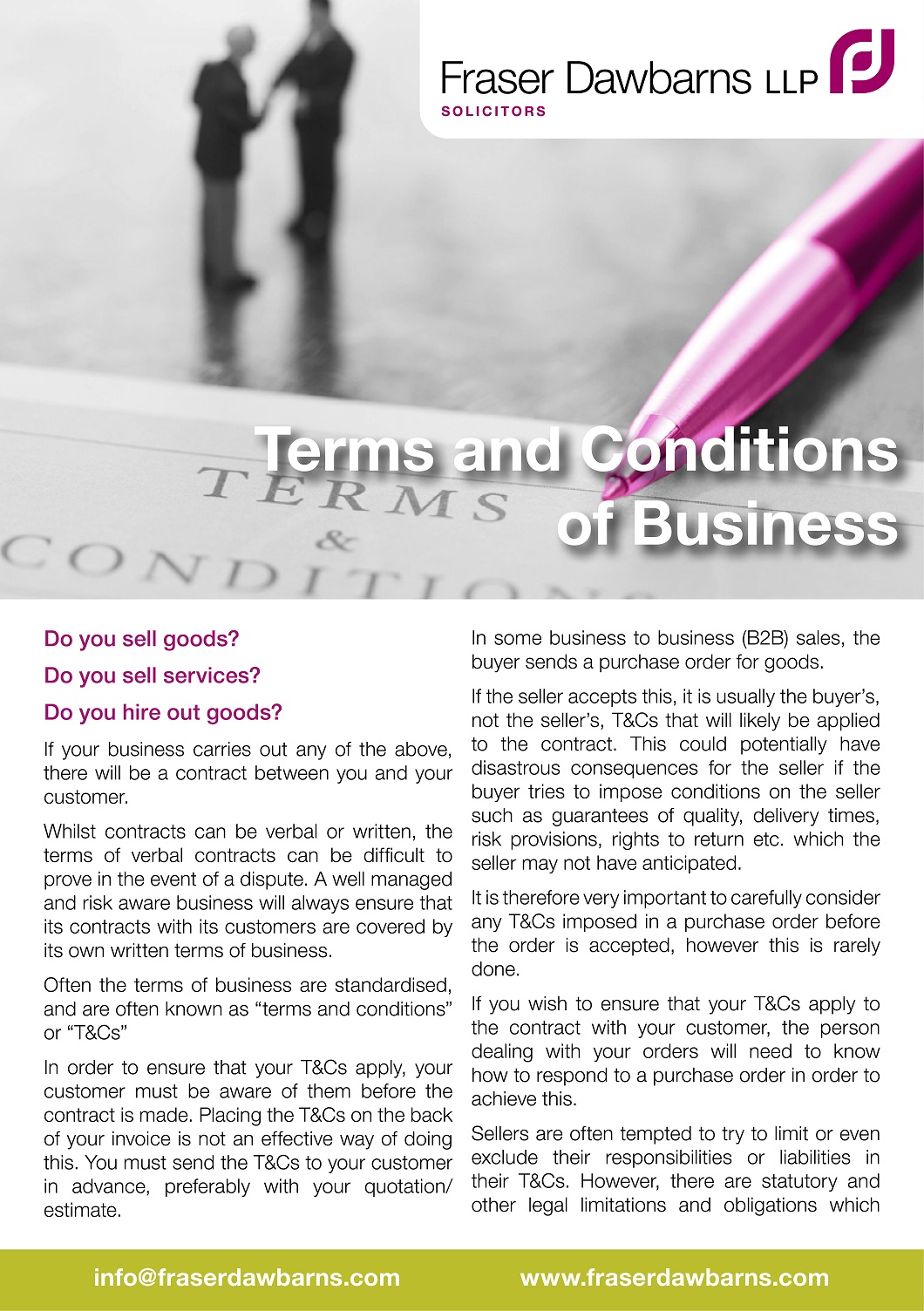Terms and Conditions of Business (Leaflet)
Commercial Contracts and Terms and Conditions of Business
Do you sell goods?
Do you sell services?
Do you hire out goods?
If your business carries out any of the above, there will be a contract between you and your customer.
Whilst contracts can be verbal or written, the terms of verbal contracts can be difficult to prove in the event of a dispute. A well managed and risk aware business will always ensure that its contracts with its customers are covered by its own written terms of business.
Often the terms of business are standardised, and are often known as “terms and conditions” or “T&Cs”
In order to ensure that your T&Cs apply, your customer must be aware of them before the contract is made. Placing the T&Cs on the back of your invoice is not an effective way of doing this. You must send the T&Cs to your customer in advance, preferably with your quotation/ estimate. In some business to business (B2B) sales, the buyer sends a purchase order for goods.
If the seller accepts this, it is usually the buyer’s, not the seller’s, T&Cs that will likely be applied to the contract. This could potentially have disastrous consequences for the seller if the buyer tries to impose conditions on the seller such as guarantees of quality, delivery times, risk provisions, rights to return etc. which the seller may not have anticipated.
It is therefore very important to carefully consider any T&Cs imposed in a purchase order before the order is accepted, however this is rarely done. If you wish to ensure that your T&Cs apply to the contract with your customer, the person dealing with your orders will need to know how to respond to a purchase order in order to achieve this.
Sellers are often tempted to try to limit or even exclude their responsibilities or liabilities in their T&Cs. However, there are statutory and other legal limitations and obligations which can render badly drafted provisions entirely ineffective. For example, if a dispute arises with a customer, and you have a clause in your T&Cs which excludes or restricts liability, it may later be decided in court may that the exclusion clause is unreasonable under the Unfair Contract Terms Act 1977 (UCTA). If so, the clause would be unenforceable, and you could have no protection.
By drawing up your contract with proper legal advice, you could ensure that you achieve the best balance in your T&Cs between protecting your business and increasing the likelihood that your exclusion clause remains enforceable. Whether your contract is individually negotiated, or it is a standard contract, if it is well drafted, you should achieve a much greater level of protection for your business.
Consumer Contracts
Contracts with consumers need particular care because they are subject to broad restrictions. They are mainly governed by the Consumer Rights Act 2015. This gives extensive protection to consumers in both goods and services contracts which cannot be excluded.
Contracts made over the telephone or in a consumer’s home or at their place of work usually give the consumer a cancellation period, which generally starts only when the consumer is given certain statutory information. There are rules affecting consumer contracts which demand that the terms should be fair, and written in plain and intelligible language. There are also lists of potentially unfair terms.
If you need any assistance with preparing or revising your terms and conditions of business, whether they relate to other businesses or to consumers, please contact the commercial team at Fraser Dawbarns LLP. Our experienced team will be able to help you to prepare terms and conditions that meet the particular requirements of your business and best protect your interests.
Why Choose Fraser Dawbarns?
- Direct access to your own dedicated lawyer
- Full range of legal services
- Clear prices & no hidden costs
Read our Other Services Leaflets Here
Fraser Dawbarns offers a wide range of services to our clients, a selection of which are detailed in the leaflets below. Hard copies are available from the reception of each of our offices. If you would like to find out more about our legal services and how we can help you, please browse the leaflets below.
- Administration of Estates
- Advice for the Elderly
- Building Disputes
- Buying or Selling an Established Business
- Buying, Selling and Remortgaging
- Employment Law for Employers
- Employment Law for Employees
- Family Matters
- Fixed Fee Divorce
- Land Registration
- Leasing Land and Commercial Property
- Legal Disputes
- Living Together (Cohabitation) Agreements
- Making A Will
- Personal Injury Claims
- Powers of Attorney
- Pre and Post Nuptial Agreements
- Setting Up a Business
- Welcome to Fraser Dawbarns
Related Articles
Recommended By The Legal 500 Directory*
*We are recommended for the following practice areas: Corporate and Commercial, Debt Recovery, Employment, Personal Injury: Claimant, Agriculture and Estates, Contentious Trusts and Probate, Family, Personal Tax, Trusts and Probate & Commercial Property.
ServicesContact

















